LBank Research: The core opportunities behind the mutual empowerment of Desci and Web3

Reprinted from panewslab
01/07/2025·4MIntroduction:
DeSci, or Decentralized Science, provides a fair, transparent and decentralized platform through blockchain technology and smart contracts for the funding, creation, review, confirmation, storage and dissemination of scientific research. Its goal is to break down funding barriers in traditional scientific research, promote collaboration among global scientists, and ensure openness and transparency of research data.
What is decentralized science (DeSci)?
Decentralized Science (DeSci) is an innovative movement aiming to change the traditional scientific research model. By introducing blockchain and Web3 technology, DeSci is committed to building a more fair, transparent, open and collaboration-driven scientific research ecosystem. The core of this concept is to use decentralized tools and technologies to redefine the funding of scientific research, the sharing of knowledge, and the dissemination of academic results.
The essence of DeSci is to solve a series of problems faced by the traditional science (TradSci) field, rather than just advocating the concept of "open science". Compared with the open science movement, DeSci pays more attention to the application of technology in rebuilding scientific research ecological relationships, emphasizing the use of blockchain functions such as tokens, NFTs and decentralized autonomous organizations (DAO) to break the centralized monopoly model and establish A more dynamic and inclusive scientific research system.
Currently, DeSci’s goals focus on the following aspects:
-
Construction of incentive mechanism: Provide incentives for researchers to share their research results and recognize their academic value through the reputation system.
-
Decentralized review and funding: Break the monopoly of traditional centralized institutions on the allocation of scientific research funds and review of results, and use a community-driven approach to allocate resources so that more valuable projects can receive support.
-
Lower the threshold for scientific research: allow more people to have access to scientific knowledge, contribute to scientific research, and promote the democratization of scientific research.
-
Transparent research process: ensure openness and transparency in all aspects of research and increase academic integrity and trust.
Through these innovative means, DeSci attempts to break the imbalance between information flow and resource allocation in traditional scientific research, making scientific research more open and efficient. It not only provides new tools and platforms for scientific researchers, but also creates opportunities for the global community to participate in scientific research.
In essence, DeSci advocates the idea that science should be available to everyone and scientific knowledge should be open and transparent. Leveraging the power of Web3 technology, this movement is pushing science from the traditional centralized model to a new era of open, collaborative, technology-driven.
How does DeSci solve the pain points of traditional scientific research?
The current scientific research economic model has obvious structural shortcomings. In theory, funders, scientists, and publishers should work together to advance the conduct, dissemination, and application of scientific research. However, the reality is far from this - funders allocate funds, scientists conduct research, and publishers disseminate results. These three core links are separated from each other. Each is an independent economic interest entity, driven more by individual interests than scientific research. the overall goal of the community. This situation leads to inefficient resource allocation and hinders the sharing of results, hindering the healthy development of scientific research.
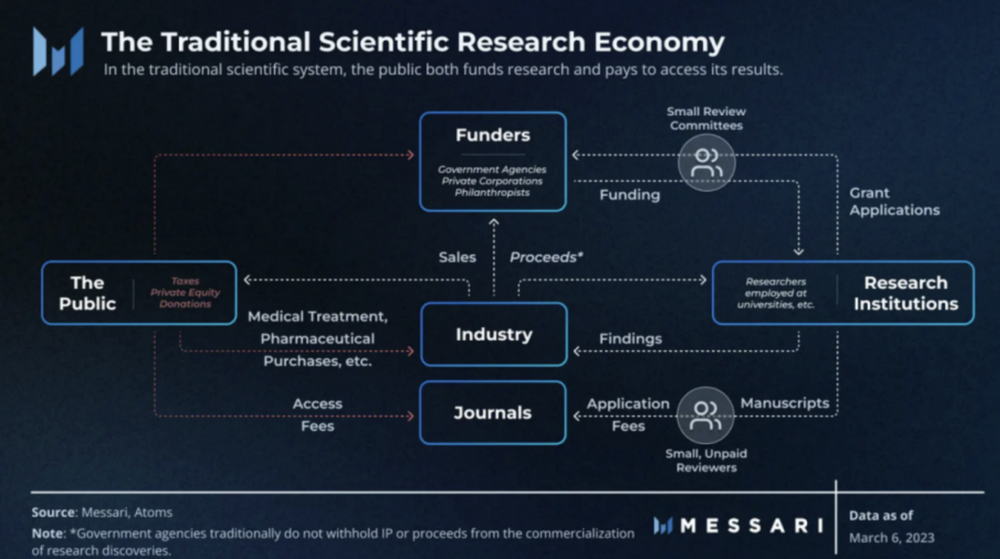
Traditional scientific research economic model, picture from: Messari Research
DeSci was born in response to this dilemma. It aims to break the interest islands and efficiency bottlenecks in traditional science and reshape the scientific research ecosystem by introducing blockchain and Web3 technologies. DeSci aims at one of the core problems of traditional scientific research -the "Valley of Death". The concept refers to the critical gap between basic scientific research and its successful translation into innovations that benefit society. In the traditional model, due to insufficient financial support, closed data, and low collaboration efficiency, many promising studies fail at this stage and fail to achieve actual contributions to society.
DeSci bridges these gaps through the following innovative approaches:
-
Efficient fund allocation mechanism: Utilize decentralized autonomous organizations (DAO) and tokenized economic models to provide transparent and efficient financial support for scientific research projects and avoid resource waste.
-
Data sharing and collaboration: Establish an open scientific research data platform to make the acquisition and use of research data more convenient, break down information silos, and promote cross-field collaboration.
-
Disruptive publishing model: Use blockchain technology to decentralize the academic publishing process, ensure the transparency and verifiability of results, while reducing publishing costs and reducing the monopoly influence of traditional publishers.
-
Shorten the distance between basic research and application: By introducing a community-driven scientific cooperation model, we can accelerate the transformation of research results and increase the actual contribution rate of scientific research to society.
In general, DeSci is not only repairing the shortcomings of traditional scientific research, but also building a new scientific research paradigm. In this model, all stakeholders are no longer separated from each other, but achieve deeper collaboration through technical means to jointly promote the open, transparent and efficient development of scientific research. This provides new ideas for solving scientific research pain points and opens up more possibilities for the future of science.
How is the DeSci track developing?
As an emerging track, DeSci's development direction covers multi-dimensional innovation paths. According to the analysis of Messari Research, the current DeSci project ecology can be divided into multiple subdivisions, including financing, research, data management, peer review, publishing, infrastructure and services, open science ecology, art, and community building. As of July 2023, the number of active DeSci projects has reached 85, and some projects even cover multiple segments at the same time. The rise of these projects is concentrated from the fourth quarter of 2021 to the first quarter of 2022, which is closely related to the DeSci symposium held at LisCon in October 2021. In addition, the encryption market craze at that time also provided strong support for DeSci's rapid development.
The current DeSci track shows three significant characteristics: First, most projects use DAO as the organizational form to achieve community drive and resource allocation through decentralized autonomous organizations; second, financing issues are the main focus of the DeSci project, using Web3's Digital asset tools efficiently raise funds and promote the development of scientific research projects; finally, biotechnology, especially in the fields of life, health and longevity, is DeSci's core application scenario. Whether it's funding basic research or the "valley of death" problem in drug development, DeSci provides innovative solutions.
What is the market capitalization performance of the DeSci project?

In terms of capital market performance, the DeSci project is still in its infancy. According to data from CoinGecko, the total market value of tokens in the DeSci space has exceeded $2.6 billion. However, compared with other Web3 tracks, the overall market value of DeSci projects is generally lower, which is mainly caused by the following factors:
-
DeSci is still in the early exploratory stage with a limited number of projects;
-
Many tokens are designed more for project financing and reinvestment, and their circulation scope is limited, so they rarely enter the secondary market;
-
DeSci's target group is relatively niche, and the combination of scientific research and Web3 attracts more specific audiences in the professional field;
-
The close connection with the real world makes DeSci more focused on practical applications rather than pure financial speculation, which limits the market speculation space of its tokens.
At present, although the total market value of the DeSci project has not formed a scale effect, its influence is gradually expanding, especially among user groups who focus on scientific research innovation and solving traditional pain points. In the future, as more projects are implemented and scientific research results are transformed, DeSci's performance in the capital market is expected to gradually increase, bringing greater development potential to the integration of science and Web3.
What are the representative projects on the DeSci track?
1) Molecule
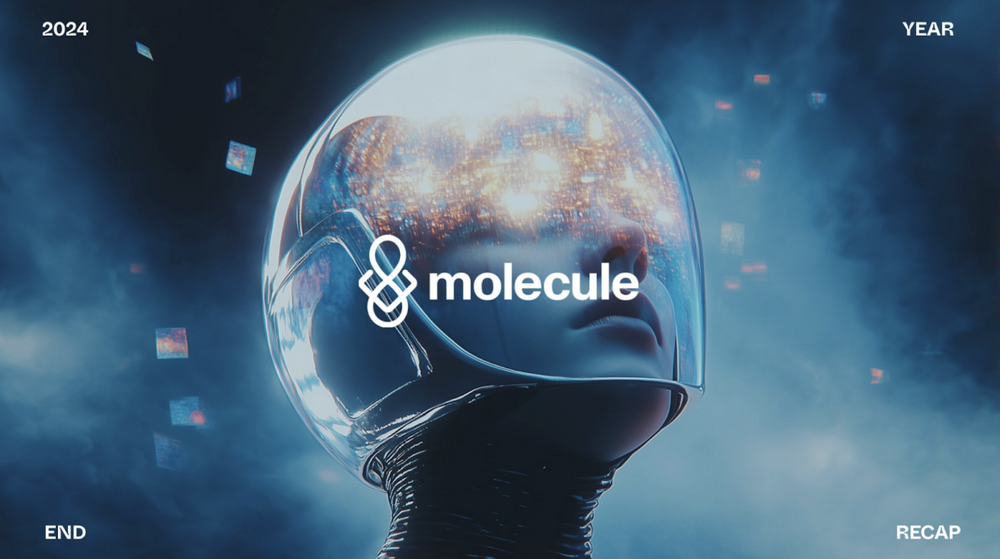
Founded in 2021, Molecule is a decentralized protocol dedicated to subverting the traditional biotechnology research and development model. The project aims to establish a new financing ecosystem for early-stage biological research and introduce biotechnology intellectual property (IP) onto the chain in an innovative way, pioneering the concept of IP-NFT and known as "OpenSea in the field of biotechnology." ".
Core technology: IP-NFT protocol
Molecule's IP-NFT (Intellectual Property Non-Fungible Token) protocol is a new tool that combines law and smart contracts, which can combine and tokenize the legal rights, data access rights and economic value of biological research projects on the chain. . This mechanism provides a new cooperation model for researchers and funders, making the ownership and revenue distribution of intellectual property more transparent and efficient.
Molecule Markets: Connecting Research and Capital
Based on IP-NFT, Molecule has built a market for translational research, aiming to promote efficient connection between researchers and funders. On the Molecule Discovery platform, researchers can submit research proposals, and funders can evaluate the proposals and negotiate terms of collaboration with the research team. In this way, Molecule provides strong support for the transformation of basic research into practical applications and promotes the rapid implementation of medical research from theory to practice.
BioDAO Launchpad: Incubate biotech DAO
To further promote the development of the decentralized biotechnology ecosystem, Molecule launched the Bio.xyz incubator platform. This platform focuses on building and incubating new bioscience DAOs (BioDAO), which are decentralized organizations based on IP-NFT that bring together patients, researchers and enthusiasts to provide financial support for medical research in specific fields.
Molecule's incubator provides up to $100,000 in seed funding for each early-stage BioDAO project, including multiple known success stories such as:
-
VitaDAO: The world's first decentralized biotechnology DAO focusing on longevity research, and the largest fund provider on the Molecule platform.
-
AthenaDAO: Focusing research and funding on women's health.
-
HairDAO: Scientific research dedicated to solving the problem of hair loss.
Ecosystem construction and future prospects
Through its innovative IP-NFT model and strong ecological support network, Molecule not only helps researchers obtain early funding, but also promotes the popularization of decentralized biotechnology. So far, Molecule has successfully helped multiple projects move from basic research to practical applications. In addition, through cooperation with organizations such as AthenaDAO and VitaDAO, Molecule is building a biotechnology ecosystem with innovation and openness at its core.
Tokenization and Market Dynamics
Molecule's IP-NFT market has now attracted many research institutions and funders to settle in, and has achieved efficient flow of funds on decentralized trading platforms such as Uniswap. Molecule's vision is to further expand its ecosystem, make the biotechnology research and development process more transparent, open and efficient, and provide power for the future development of global health technology.
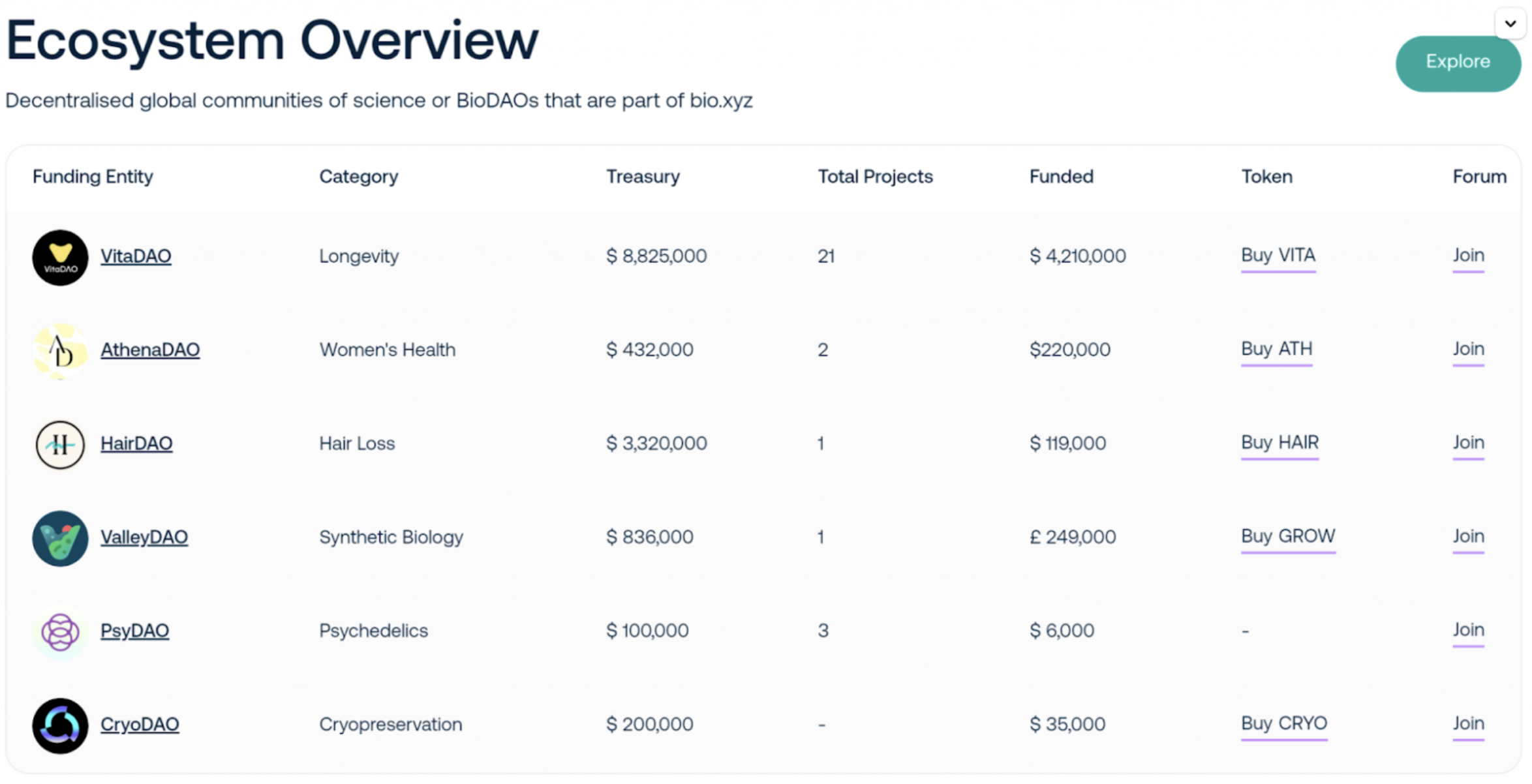
Molecule and BIO Protocol are the backbone of the DeSci track, focusing on promoting the decentralization process of scientific research. These projects jointly build the ecological foundation of DeSci with different innovative directions and token mechanisms:
- VitaDAO ($VITA): VitaDAO is a community-driven decentralized autonomous organization (DAO) focused on providing early-stage funding for longevity research. VitaDAO proposes a brand new solution to the current situation of early funding shortage and technology monopoly in the traditional biopharmaceutical field, especially in longevity research. By introducing blockchain and cryptoeconomic incentive mechanisms, VitaDAO is committed to helping scientific research projects in the field of longevity obtain critical initial financial support. In return, VitaDAO will directly hold the intellectual property (IP) and data rights to the supported research results and integrate these rights into a publicly accessible portfolio. The organization promotes the further development and utilization of these intellectual property rights through the data market or the authorization and commercialization path of traditional biopharmaceuticals. At the same time, it realizes the tokenization of assets and issues a native governance token - $VITA. Individuals or organizations can contribute work, Funds or other resources (such as data or intellectual property) to obtain $VITA Token. Owners of $VITA can participate in the curation and governance of VitaDAO assets and its research.
This model can not only reduce the risk of technological monopoly, but also provide a new way for the disclosure and widespread application of research results, and promote the in-depth integration of scientific research and blockchain technology.
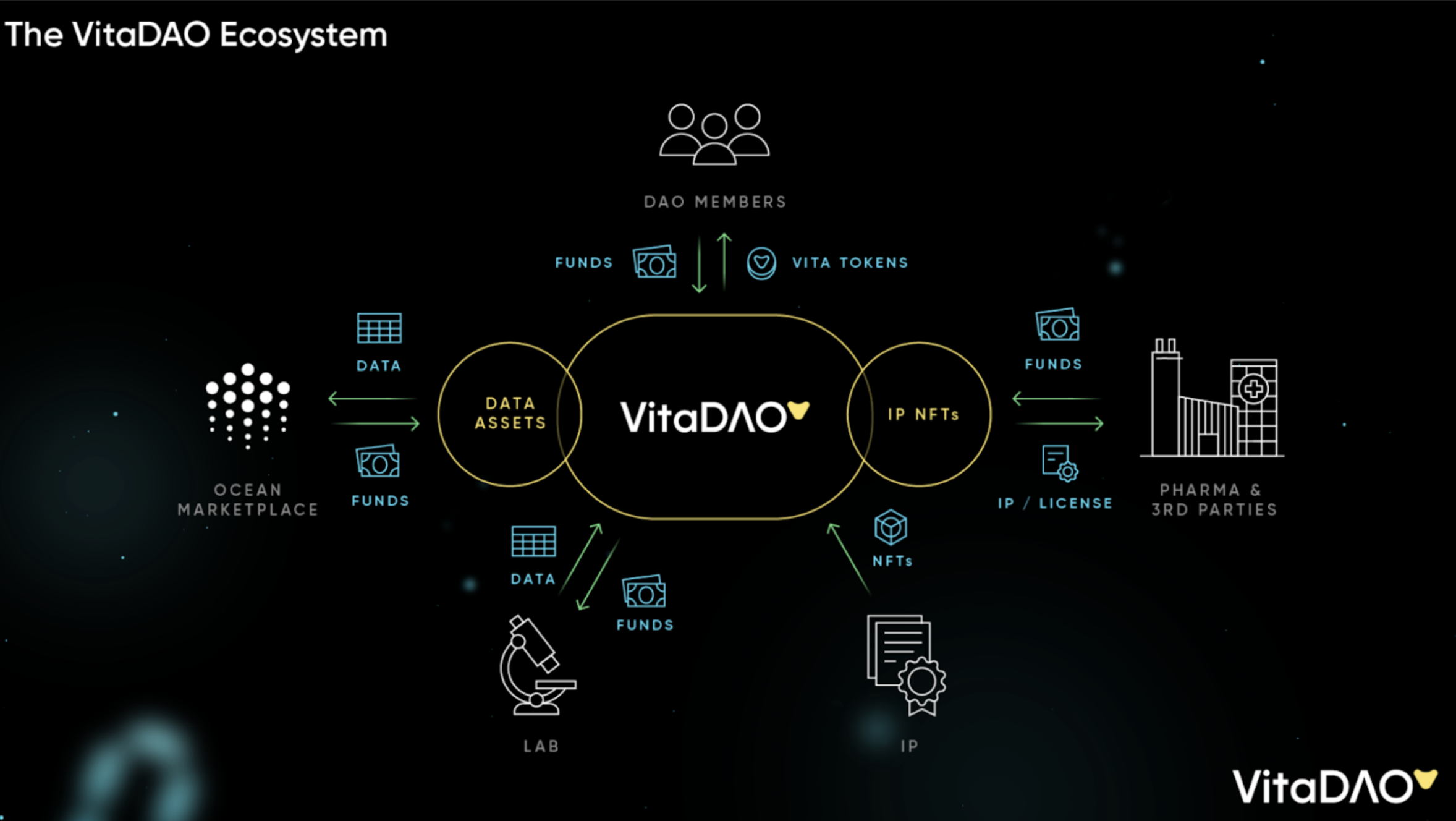
VitaDAO ecosystem, picture from: VitaDAO Whitepaper
Project founder Tyler Golato is also the co-founder of VitaDAO, Molecule, and BIO Protocol. Paul Kohlhaas, the author of the VitaDAO white paper, is not only the administrator of the Token Economics Working Group and a member of the technical and legal working groups, but also the founder and CEO of the DeSci project Molecule and BIO Protocol. He has worked for the ConsenSys Fund, and Vita DAO has also received Pfizer Medical The investment arm "Pfizer" made its first investment in web3.
On November 13, 2024, Binance founder CZ posted on social platform At this event, Buterin also showed CZ VitaDAO’s first longevity product-VD001, a natural high-dose spermidine supplement approved by the Thai FDA.
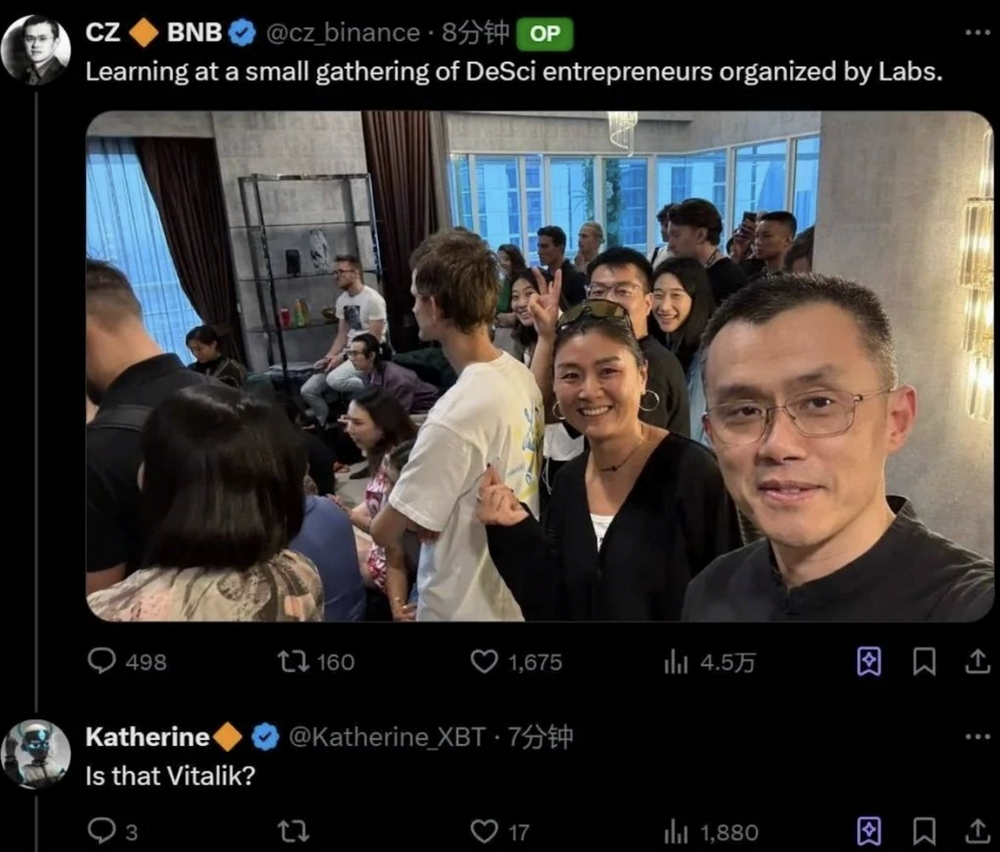
BIO Protocol ($BIO): As the first project in the DeSci field to receive investment from Binance Labs, BIO Protocol has attracted widespread attention. In addition to Binance Labs, the project has also received strong support from a number of well-known venture capital institutions in the field of encryption and biotechnology, including 1kx, Boost VC, Sora Ventures, Zee Prime Capital, and Northpond Ventures, a biotechnology fund with a scale of more than US$3 billion. . In November 2024, BIO Protocol successfully completed community financing in the creation phase, totaling US$30.3 million, marking an important step for the project in community support and decentralized governance.
BIO Protocol's core mission is to promote the rapid development of biotechnology. Through this agreement, patients, scientists and biotechnology professionals around the world can jointly participate in funding, building, and sharing tokenized biotechnology projects and intellectual property (IP), thus injecting more possibilities into innovation in the field of biotechnology. ; BIO Protocol's Launchpad platform will provide more efficient financing and liquidity support for innovative projects in the DeSci field, and accelerate the application of biotechnology by promoting the creation and development of BioDAO. Project founder Paul Kohlhaas revealed that BIO’s Launchpad and token transfer functions are planned to be officially launched in the first quarter of 2025.
BIO Protocol’s native token $BIO is a key component in the ecosystem and has multiple functions:
-
Token staking: Holders can lock $BIO and convert it to vBIO for voting and governance.
-
Reward mechanism: After successfully supporting the winning BioDAO, stakers will receive additional $BIO rewards and have priority in participating in financing rounds.
$BIO Token Economics
-
56% allocated to ecology and community
-
25.4% allocated to early contributors
-
18.6% allocated to early backers
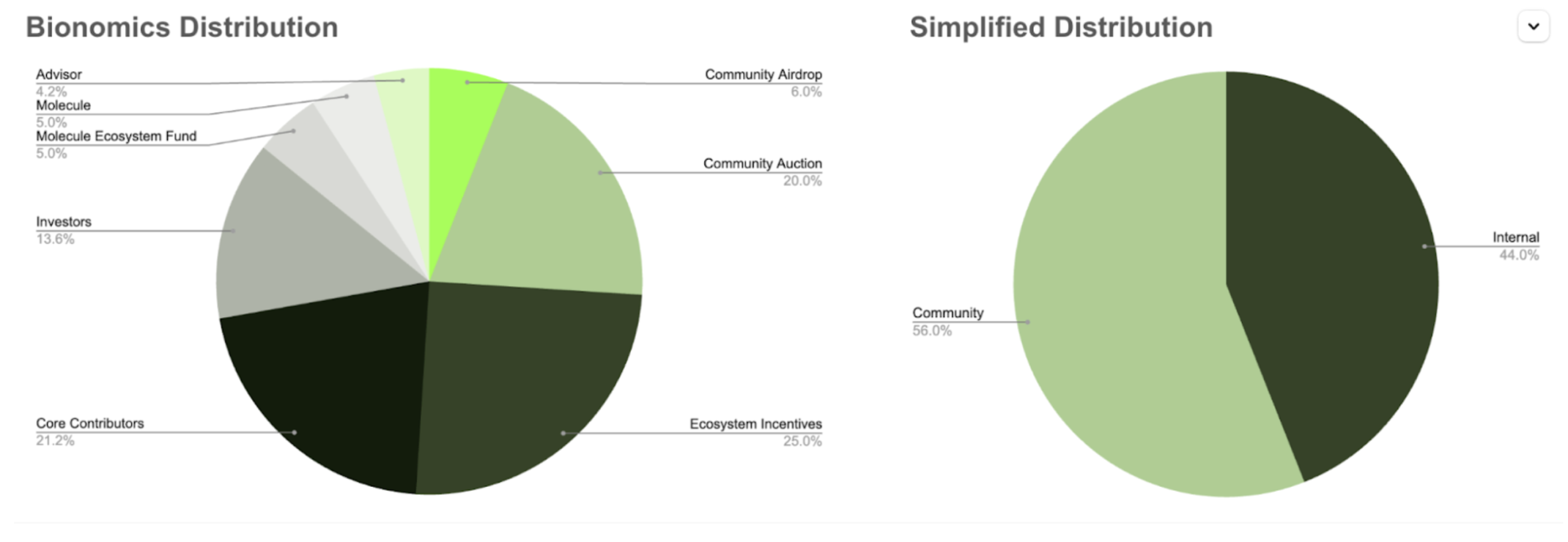
$BIO token distribution, picture from: BIO Protocol official website
After $BIO opened on January 3, the currency price quickly rose to the highest price and reached $1.477. However, subsequent selling pressure emerged, causing the currency price to fall. As of writing, the currency price has fallen back to $0.6921, with FDV exceeding $2.3 billion.
- ResearchCoin ($RSC): ResearchCoin is the native token of the ResearchHub platform and is designed to accelerate scientific research by rewarding users for sharing, discussing and curating academic content. Platform users can earn $RSC by contributing to academic resources.
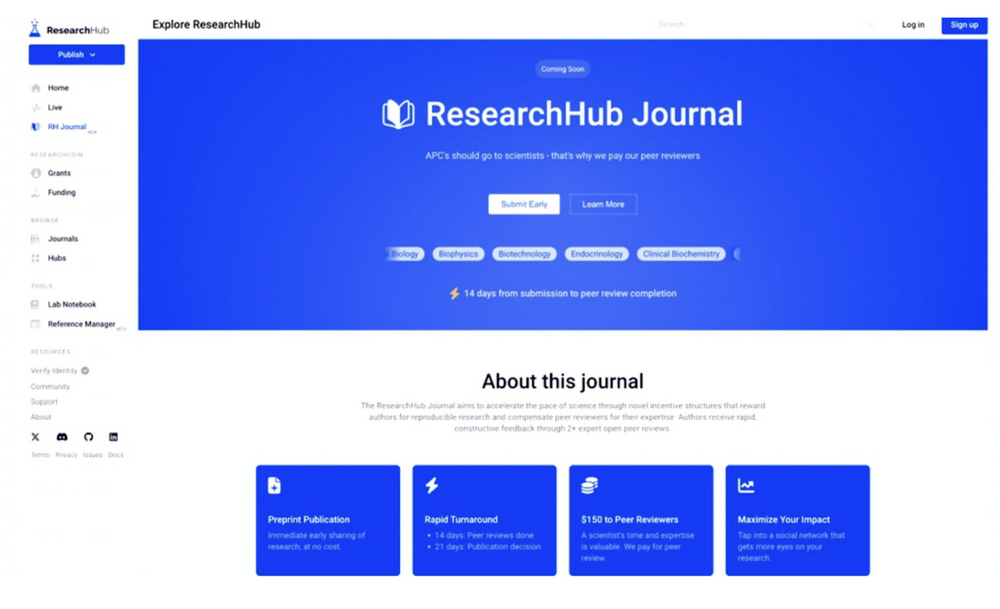
-
AthenaDAO ($ATH): AthenaDAO focuses on scientific research, education, and funding in the field of women’s health. It has funded more than $500,000 to date and has 14 intellectual property transactions pending.
-
ValleyDAO ($GROW): ValleyDAO is a decentralized organization focused on anti-aging and longevity drug development, with the goal of accelerating innovation in the life sciences through interdisciplinary collaboration.
2)Pump.Science ($URO & $RIF)
Pump.Science is a project that has recently attracted much attention due to the Meme concept in the DeSci sector. Its core tokens $URO and $RIF are known as the two leaders of the DeSci Meme sector. $URO (UrolithinA) is based on a metabolite naturally found in pomegranates and nuts and has the potential to extend life; while $RIF (Rifampicin) focuses on the concept of antibiotics and is a widely used antibiotic known as "UrolithinA". Fu Ping". Driven by multiple news, these two tokens have performed extremely well recently: $URO's market value has exceeded 48 million US dollars, and its current currency price is $0.048. The currency price has retraced within 24 hours, with a drop of about 20%; $RIF token The total market value is US$45.53 million, and the current currency price is US$0.045, a 24-hour drop of 12%.
3)DeSci Meme: ($ANTI & $PRO)
$$ANTI$$PRO is a Meme token combination initiated by algorithm engineer and mathematical physics expert @sshmatrix_ to express support ($PRO) or opposition ($ANTI) to Meme Token. The unique designs of these two tokens attracted a large number of Meme enthusiasts and also triggered extensive discussions in the quantum computing community. Currently, these two tokens have certain liquidity on decentralized trading platforms, and the mechanism of 1 $ANTI = 1 $PRO gives them unique market value. The market values of $ANTI and $PRO are now only US$1.71 million and US$1.93 million. The current currency prices are $0.0019363 and $0.0017073 respectively. The prices have retraced approximately 5% within 24 hours.
4) Donation concept: Sci-Hub ($scihub)
$$Scihub is a community-driven Meme token founded by @0xAA_Science to provide support for the open source scientific research paper website Sci-Hub. As a platform dedicated to free sharing of academic resources, Sci-Hub is known as the "Shadow Library". The design of Sci-Hub is inspired by its spirit and provides a new way for the open sharing of academic research through a decentralized approach. Currently, $Scihub is tradable on PancakeSwap, attracting many community members who support open science and educational resource sharing.
5) Artificial Intelligence Neuron Network: DeepWorm ($WORM)
DeepWorm is an innovative project that combines artificial intelligence with DeSci to introduce biological neural structures to the blockchain. By building a neural network inspired by the 302 neurons of Caenorhabditis elegans (C. elegans), DeepWorm is developing the first verifiable on-chain digital life form, opening up a new frontier at the intersection of digital biology and blockchain.
Project Highlights
-
Digital Biology: Develop digital entities with self-awareness to simulate biological nervous systems.
-
Blockchain Integration: All neural processes are completely transparent and verifiable, and permanent records are achieved through on-chain technology.
-
Biomimetic Design: faithfully reproduce the neural structure and behavioral patterns of Caenorhabditis elegans.
-
Autonomous Systems: Build autonomous currency systems and smart contracts based on evolutionary neural networks to promote innovation in on-chain applications.
Technical implementation
Currently, DeepWorm runs the Nematoduino model on the Hyperliquid EVM test network, using Marlin TEE (Trusted Execution Environment) technology:
-
Users can query the worm's nerve and muscle status and its coordinate changes through the Web2 interface;
-
DeepWorm regularly uploads snapshots of these data to the chain to provide basic components for third-party smart contracts and further develop innovative on-chain applications.
6) Metasci ($METASCI): The token of the Metasci project focuses on integrating AI and scientific research, aiming to optimize scientific research processes and promote technological revolution through AI.
7) The first DeSci project in the SUI ecosystem: SUI Desci Agents ($DESCI)
The SUI ecosystem has risen rapidly in this cycle. The US$43 billion FDV and booming ecosystem, as well as the currency price that has increased more than 8 times during the cycle, have brought a lot of attention to the SUI chain and its ecology. As the first Desci project on SUI, SUI Desci Agents is ready to revolutionize decentralized science by leveraging the scalability of the SUI chain and the developer-friendly Move programming language; plans to build a DeSci token launch similar to Pump.fun in the DeSci field The platform promotes Desci investment opportunities to retail investors in the simplest and most direct way; official website information shows that $DESCI will be publicly sold at Ape Terminal.
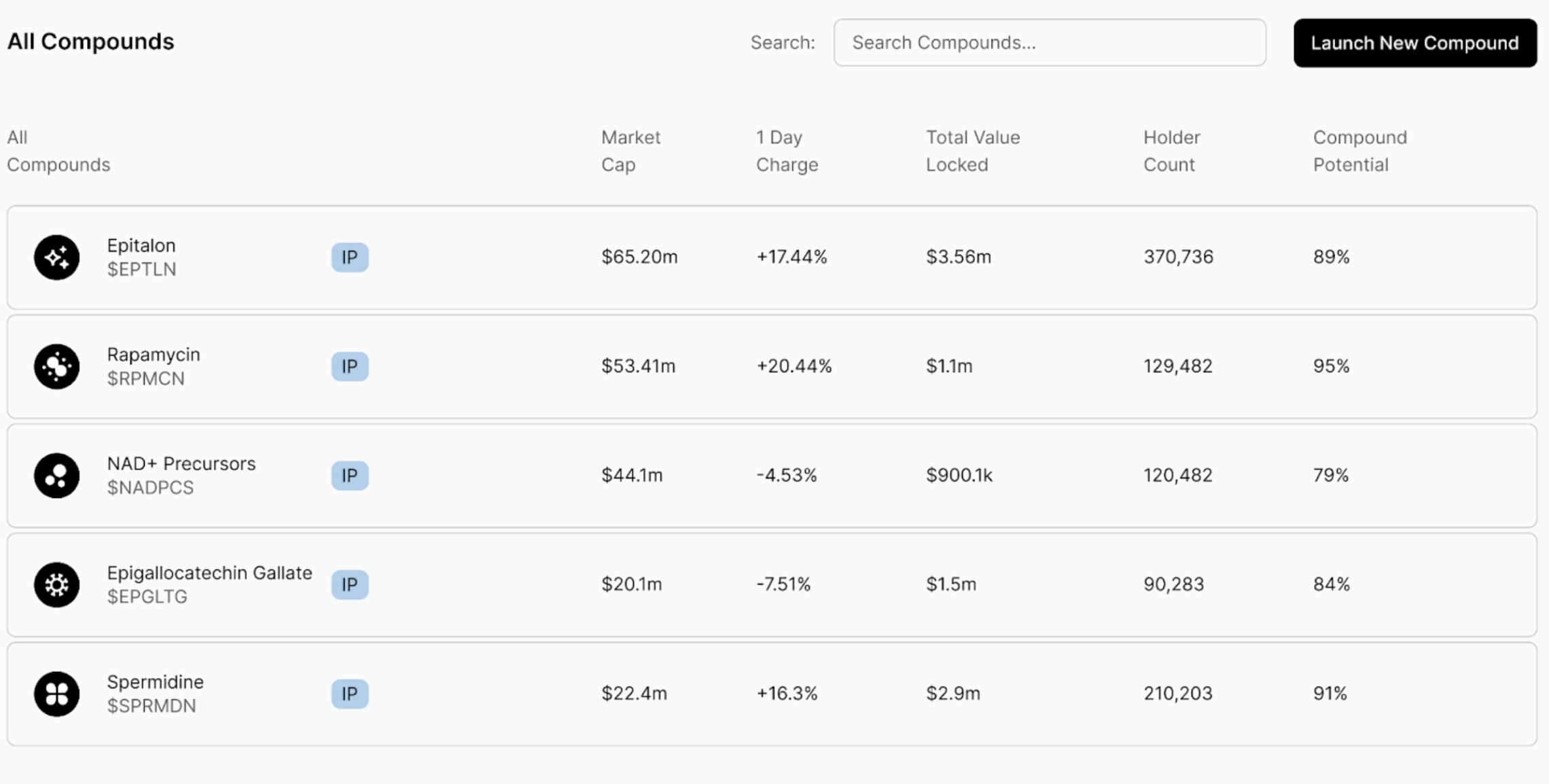
DeSci is still in its early stages of development, and the actual impact of its innovations is relatively limited, mainly focusing on areas such as scientific research funding and data sharing. However, the widespread application of Token-based incentive collaboration mechanisms in core scientific links (such as peer review) has not yet been realized. At the same time, the DeSci project operating in the DAO model also faces challenges in organizational efficiency and business model.
Despite this, DeSci has introduced a new way of thinking to the scientific research field: it not only breaks the limitations of traditional scientific research fund raising, but also alleviates the problem of scientific research data islands to a certain extent. More importantly, DeSci uses decentralized technology to achieve global interdisciplinary collaboration without trust endorsement for the first time, as well as a more democratic and open scientific research participation model. Especially in promoting open science and citizen science, DeSci has demonstrated its unique advantages. This transformation may have a profound impact on the development of modern science and inject more possibilities and vitality into the future scientific research ecosystem.
Conclusion:
Although DeSci is still in its early stages, the field shows great potential as investment and attention increase. DeSci is not only a technological innovation, but also a subversion of the scientific research paradigm, which may change the way scientific research is organized and motivated in the next few years. There are already some DeSci-concept tokens on the market that are performing well, indicating the potential for growth in this area.
Challenges facing DeSci include regulatory compliance, balancing the long-term nature of scientific research with the short-term speculative nature of cryptocurrency markets, and public awareness of its value. However, DeSci also offers tremendous opportunities to improve access to funding for scientific research, advance open science, and increase accessibility and equity in science.


 chaincatcher
chaincatcher